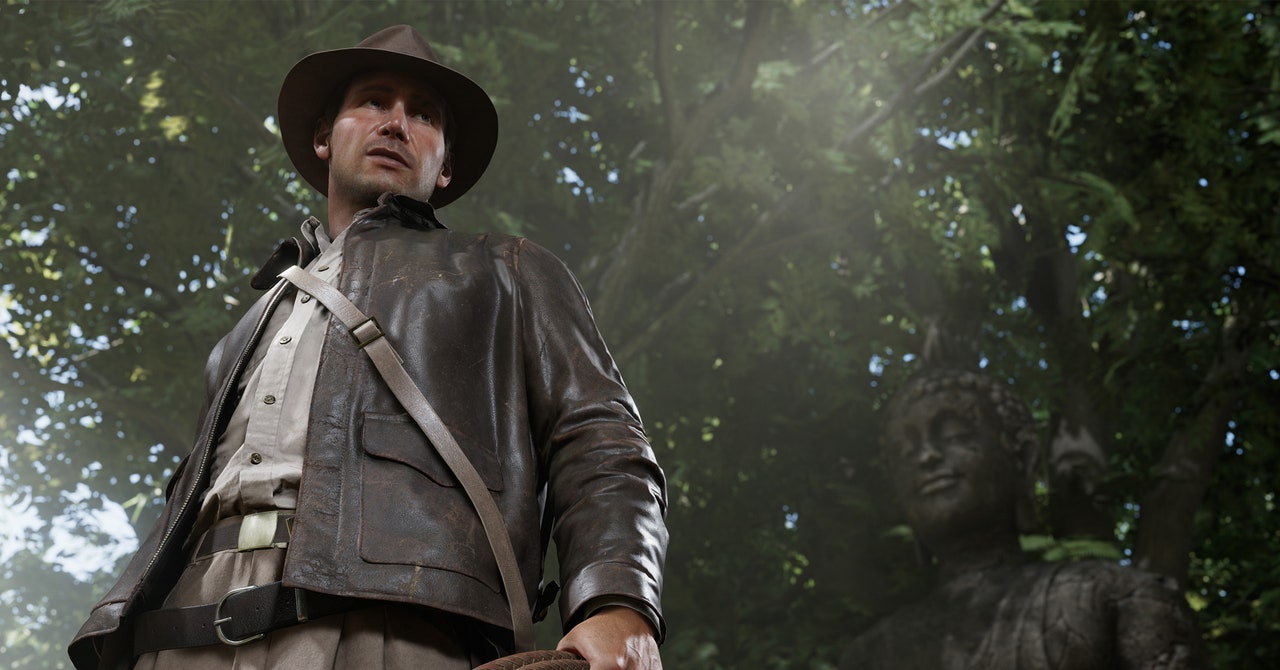
In games, as in film, Indiana Jones has had a rough patch. The intrepid archaeologist’s recent big-screen exploits have met with lukewarm reception at best, with 2008’s The Kingdom of the Crystal Skull and 2023’s The Dial of Destiny both failing to reignite the excitement enjoyed by the original 1980s trilogy; so, too, have his gaming excursions struggled. A defunct Facebook game, a handful of mobile efforts, and a couple of Lego outings over the last 15 years are all poor follow-ups to the likes of The Fate of Atlantis. Thankfully, The Great Circle marks a reversal of fortunes. This is an adventure impressive enough to stand alongside Spielberg’s finest cinematic moments.
It could have gone the other way. Early on, developer MachineGames hewed too closely to the movies’ template, with an intro sequence that replicates almost shot-for-shot (bar the first-person perspective) the opening to Raiders of the Lost Ark. The result is a linear experience that feels scared to deviate from the Holy Trilogy, reverent of their standing to the point of timidity. Mercifully, this is largely restricted only to the tutorial section—one boulder escape and a rescued fedora later, we jump to 1937 and the game begins to show what it’s really made of.
Set between Raiders and The Last Crusade, The Great Circle properly kicks off when a seemingly unimportant relic is stolen from Dr. Jones’ academic home of Marshall College by a towering man in black, the only clue left behind being a pendant pointing Indy to the Vatican. Faster than you can pack a bullwhip and trace a red line across a map, Indy’s teaming with investigative reporter Gina Lombardi to uncover an ancient order of giants, all while chasing down Nazi madman Emmerich Voss, who seeks to unearth occult forces to give Hitler a supernatural edge in the war.
Rather than go the fully open world route, MachineGames opts instead for contained sandbox areas for each scene. From the Vatican to Gizeh (now Giza), to Sukhothai in Siam (now Thailand), every stop on the hunt for Voss is gorgeously realized and packed with mysteries to uncover, but not so dauntingly vast that exploration becomes a chore. There’s a fantastic verticality to locations, from scrambling across rooftop mazes to crawling through crypts, making each area feel even larger. Although certain elements repeat in each key setting—find a disguise to blend in, aid some locals, try to find key artifacts before Voss—you’re unlikely to stand still long enough for it to ever become stagnant or repetitive.
The result is that The Great Circle almost feels like two games in one, depending on your preferred play style. Barrel through core quest objectives, and it’s a zippy, interactive Indiana Jones movie, packed with all the humor, thrills, and charm audiences have come to love. Take your time to hunt down every collectible and solve every ancient puzzle, and it feels like an evolution of Uncharted or Tomb Raider, the two gaming franchises most influenced by Indiana Jones in the first place. A great circle, indeed.
No Ticket!
It’s all quite a departure from the developer’s earlier Wolfenstein games. While there’s no shortage of Nazis (or Italian Blackshirts, or Imperial Japanese soldiers) for Indy to punch out, there’s not necessarily any benefit to killing every fascist you encounter. The emphasis is firmly on stealth, subterfuge via disguises, and judicial use of combat only when necessary. Opening fire on enemies is only likely to attract even more unwanted attention, which rarely ends well—far better to use any gun as a cudgel to quietly bludgeon enemies unconscious. You’re occasionally treated to a pithily sardonic punchline from Indy in the process.
Melee combat is one of the great strengths of The Great Circle. Whether stunning a Nazi guard from behind with a sneakily delivered rifle butt or hand-to-hand bare-knuckle boxing, every blow lands with an incredibly satisfying heft to it. It feels entirely authentic for the character—Indy hasn’t been reimagined in the model of Wolfenstein’s BJ Blazkowicz, gunning down anything that moves. He’s still the flawed and extremely breakable hero who gets by on luck more often than brute force. That sense of vulnerability creates opportunities for perfect Indy moments, like dashing to knock out a Nazi captain who’s spotted you, pummeling him at the very last second before he can alert others with his whistle. It all feels fantastic.
Services Marketplace – Listings, Bookings & Reviews
